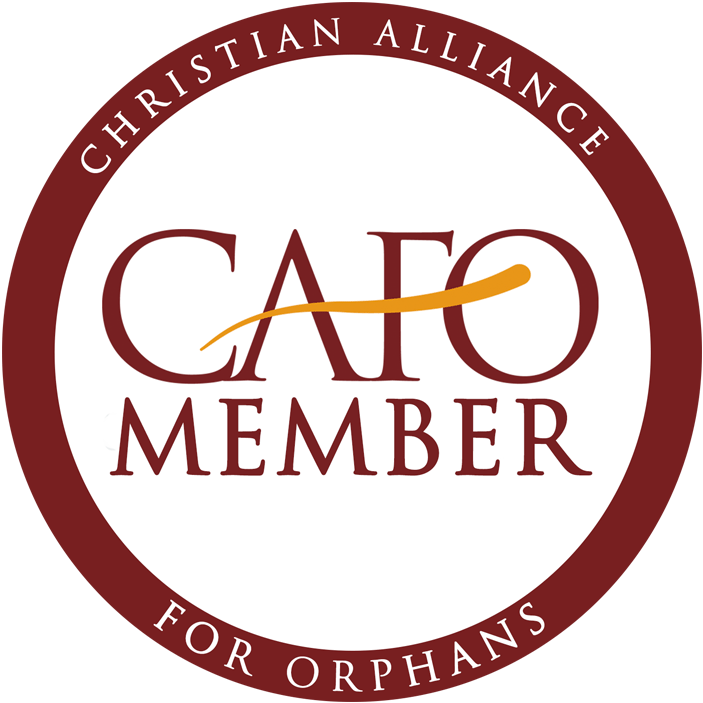
"It matters that she knows I’m going to still be there each month."
Kelsie Barnhart first heard about TFI and the mentoring program through a friend in the summer of 2014. She had just graduated college and was working full time, but knew she wanted to carve out time to serve her community. Becoming a foster parent wasn’t a practical way for her to minister to the many foster children in her area, but mentoring was. She began mentoring in January 2015 and has been a consistent person in her “Little Buddy’s” life since. Find out what she’s learned through her experiences as well as hear advice on getting started!
Kelsie almost gave up on mentoring—she had done the training and had been matched with two different children. One was a 17-year-old; the other a four-year-old. “Neither worked out for different reasons—I was a little hesitant to mentor the teen since I was only a few years older and the other little girl was in some difficult circumstances.” Six months passed from the time she completed the training until she was finally matched with her Little Buddy. The long wait was confusing, but God’s timing ended up being perfect.
When Kelsie started mentoring, she knew about as much as any layperson does about foster care—what it was conceptually. What she didn’t realize was the depth and variety of things that her Little Buddy had already seen or gone through in her young life. “I knew there were a lot of kids in foster care, and that caused me to take the first step,” she says. “Training to become a mentor helped me realize that I could make an impact now in someone’s life.”
The things that her Little Buddy focuses on sometimes catch Kelsie off guard. “As a ten-year-old, she is entranced by families. We’ll see people together and she’ll create possible connections between them, like, “Do you think they are sisters? or “Is that a mom and dad?” She still doesn’t want to answer questions about her own family relationships, but she’ll ask questions about marriage or Kelsie’s family. “She’s trying to figure out what a family is supposed to look like,” says Kelsie. “They aren’t hard questions, they just catch you off guard sometimes!”
Getting started
In January 2015 when Kelsie and her Little Buddy were matched, the little girl was six years old and was in kindergarten. Their first time together was a trip to the library. During the few hours they had together, Kelsie noted how far behind the little girl was regarding her reading readiness. She’s been encouraged by the fact that the girl is now reading at grade level, due in part to their consistent interactions and Kelsie’s willingness to spend time with her one-on-one. Not that her foster mother wasn’t also encouraging her to read, but the relationship between a child and a parent or foster parent is different than that of a child and a mentor.
The first few times they met, Kelsie and her Little Buddy were both nervous. The little girl had been in foster care for a while, so she was used to having different people in her life. Kelsie could tell that she was feeling her way through what this new relationship might look like and how long it might last.
Kelsie, meanwhile, decided to look for behavioral things to pay attention to. “I wanted to build things in common with her—especially experiences that would be something she’d want to remember.” The theory and reality of how their times together weren’t always the same, however. Kelsie remembers that their first trip to a coffee shop went very differently in real life than she had envisioned: The cocoa was too hot when her Little Buddy took a drink and she spewed it everywhere. Even though that didn’t go exactly as planned, it was something they remember.
The long-term relationship of a mentor has allowed Kelsie to speak into her Little Buddy’s life. “Our conversations have changed over the years—we can go deeper faster now. She’ll share more and go more in depth. And we have more opportunities to talk about the Lord,” says Kelsie. Getting to this level of depth has taken time, just as building trust takes time.
Teaching by example
Kelsie didn’t really know what to expect as far as behavior went when she started mentoring, but she knew right away there were some behavioral issues she wanted to address. Instead of confronting and correcting her Little Buddy every time, Kelsie chose to lead by example—“I didn’t want to shame her,” she says.
For instance, her Little Buddy was a really messy eater at the beginning—so much so that Kelsie noticed people watching. Instead of telling her “You need to do this or not do that,” Kelsie would say, “I’m going to act like I’m at a castle,” then would put her napkin in her lap and use it to wipe her mouth, use her fork and knife properly, and so on. It became almost like a game—her Little Buddy began to mimic her and started learning simply by following Kelsie’s example.
Another issue Kelsie faced immediately was that her Little Buddy often lied. “She would see someone and say, ‘I know that person’ or say that she had done an activity before when she hadn’t. It went on for a couple of months—her Little Buddy thought it was funny. Finally, Kelsie gently confronted her about it and told her she only wanted to hear words that are true. Approaching the issue in a positive way has resulted in a drastic decrease in lying behavior.
Interacting with the family
Kelsie’s Little Buddy lived with an older single foster mom who now has a great relationship with Kelsie, especially when it comes to working out a time for Kelsie and her Little Buddy to have time together. At the beginning, it wasn’t quite that easy, however. “I just think the foster mom didn’t fully understand what my role as a mentor meant—she treated me more like a caseworker and told me all the problems and frustrations she had.”
That has since gotten better and now Kelsie and the foster (now adoptive) mom support each other in their individual roles. “I try to be on her (foster mom’s) side. So, if my Little Buddy is complaining about bedtime and doesn’t want to go to sleep, I’ll try to reinforce the idea that it’s important to get a good night’s sleep.” Again, Kelsie tries to use positive ways to enforce what mom is trying to do and works to do it in such a way that her Little Buddy doesn’t feel like she’s always being directly told what to do.
Practical aspects of mentoring
Kelsie and her Little Buddy started off meeting every other week, but it soon became apparent that meeting that frequently was difficult for both Kelsie and the foster mom. They now meet monthly for 3-4 hours at a time. Typically what will happen (and it would be different for different mentoring relationships—there are no set “rules”) is that Kelsie picks her Little Buddy up and they have a meal together. During this time, Kelsie can reinforce things like table manners (by example), and they have opportunity to pray and have unguarded conversation. “It seems pretty easy to talk about things while we’re eating,” says Kelsie.
Then they do an activity together—it might be going to play at the park, going to the library, watching a show—things that her Little Buddy might not have the opportunity to do very often. A few of Kelsie’s Little Buddy’s favorite times include seeing The Nutcracker, eating at Hibachi Grill where she talked with a man from France, painting pots and planting succulents. They collect new experiences that they can later talk about as they continue to build a shared history.
Not everything goes perfectly as planned (see cocoa incident above). Once Kelsie planned a two mile hike, but neglected to bring water. Her Little Buddy wasn’t too thrilled about that particular experience. The important thing, Kelsie reminds those who might be considering becoming a mentor, is that mentoring can look as individual as the two people who are put together.
Resources
Kelsie suggests talking with someone in the foster care or adoption field when you are thinking about becoming a mentor. Her friend who is an adoption caseworker was a great resource and Kelsie was able to ask questions about the foster care process. She also reads or saves articles she comes across that discuss common issues and help shine a light on specific behaviors such as food issues.
Lessons learned
Kelsie shares these specific lessons that she’s learned through her mentoring experience:
Consistency – This is so important to her Little Buddy. “Consistency is the biggest thing for her…it matters that she knows I’m going to still be there each month.” Kelsie tries to make sure they see each other every month—even when it isn’t easy because their schedules are hard to coordinate at times. “She always asks me at the end of our time, “Will I see you again?’”
Power of apologizing – Kelsie has learned that her Little Buddy is more likely to do things that have been modeled to her instead of being told. This includes apologies. “There are times I’ve had to apologize to my Little Buddy, even when my excuse is valid for whatever happened. She feels it.”
Traditions – The goal of a mentoring relationship is to be long-term, so now that they’ve been meeting for a couple of years, they’ve been able to establish some traditions. These may be specific places or activities (going ice skating or eating at a specific restaurant at Christmas), or just activities they do every time they are together (e.g., playing the “street sign” game where her Little Buddy looks for a specific letter or a street name when they are in the car).
Unique opportunity for affirmation – Kelsie tries to take advantage of the times she can affirm her Little Buddy and speak truth into her life. For example, “she doesn’t know how smart she is, but she has a really good memory. So when I make small comments about that, it builds her up. Or if she’s doing something in a positive way, I try to notice and call it out.”
Humility – Even though Kelsie spends time and money to do things with her Little Buddy, she rarely gets a “thank you” in return. “I’ve had to exclude that expectation, but it’s not easy.” Instead Kelsie gives her Little Buddy grace to learn the importance of gratitude—and it’s made a difference to Kelsie as well. “It’s the nature of the Lord to use things like this to refine our character!”
Not called to fix everything – Another reality Kelsie has had to realize is that she has not been called to fix every one of her Little Buddy’s bad habits. Instead, “God is calling me to have more grace toward her, love her where she is and set a good example.”
All in all, “it’s been a huge learning experience for me,” says Kelsie.
For those who may be considering mentoring
Kelsie’s advice to those who may be thinking about mentoring a child in foster care is to first pray about it, but then be obedient and take the next step, whether that’s going to a training session, reading a book or contacting an organization like TFI that has a mentoring program. “Taking the next step is huge,” she says.
Finally, she suggests going into mentoring with hopeful expectations, but be realistic about what it will be like. Each mentoring relationship will be unique. “Throw out your expectations of what you think it’s going to be like,” she says.
RESOURCES FROM TODAY’S SHOW
Kelsie’s Facebook
Kelsie’s Instagram
The TFI Story
Who Loves Series
Find a TFI Advocate Near You
Become a TFI Advocate
Hopefully, this episode has helped you right where you are on your foster care journey. That’s the goal. If you enjoyed it, will you tell others?
The best way to do that is to rate the podcast on Apple Podcasts and leave us a brief review! Your ratings and reviews help us get this podcast in front of new listeners. Your feedback also lets us know how we can better serve you. Thank you so much!

Meet Our Guest
Kelsie was born and raised in Peoria, Illinois, where she graduated from Bradley University with a degree in Public Relations. She is currently an Advocate at Samaritan Ministries, a health care sharing ministry serving over 200,000 members internationally. Kelsie grew up loving Jesus, but started to seriously follow Him in college and currently attends Bradley Epworth Church. She has been a Foster Care Mentor since 2015. In her free time, Kelsie enjoys going on insanely long walks, listening to audiobooks, drinking decaf lattes, or dreaming with the Lord about her next adventure.
Get practical episodes and updates in your inbox.
Be the first to know about new episodes, posts, resources, and stay in the loop about what’s coming up.
Other Episodes You Might Enjoy:









